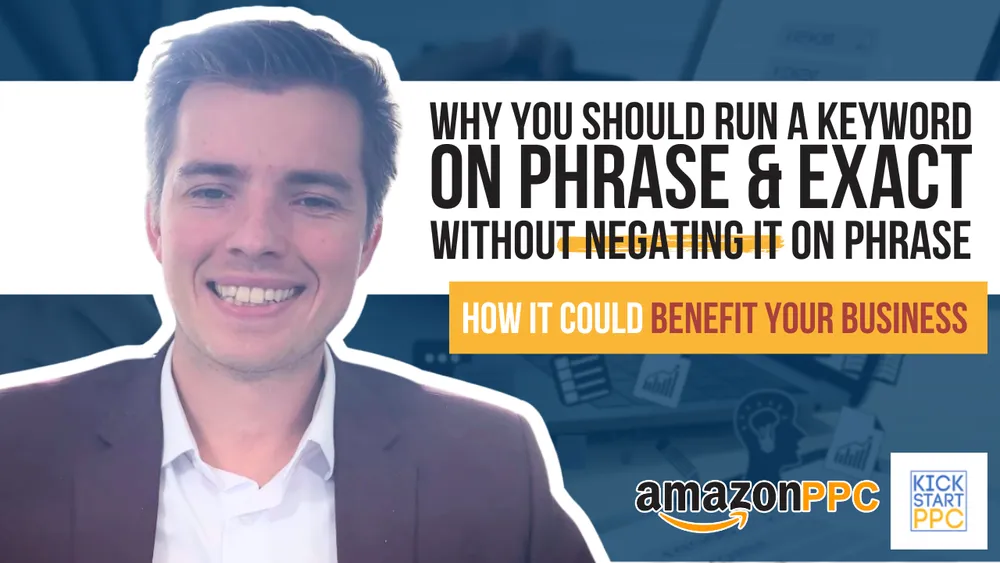
Why you should run the Same Keyword on Phrase & Exact without Negating it Amazon PPC - Amazon Seller
Running Amazon PPC campaigns can be complex, especially when it comes to deciding whether to run the same keyword on multiple match types like exact, phrase, and broad. A common strategy many sellers consider is to negate a keyword in broad and phrase match types once it has been moved to exact match. However, this approach may not always be the best strategy for your business. This blog post will delve into why running the same keyword on phrase and exact match without negating it can be beneficial for your Amazon PPC campaigns.
Understanding Match Types
Before diving into the reasons why you should run the same keyword on both phrase and exact match types, let's quickly review what these match types are and how they function within Amazon's PPC ecosystem.
Exact Match: This match type allows your ad to show only when the exact keyword or close variants (like plurals) are searched. It gives you the most control over where your ads appear, typically leading to higher conversion rates because the search intent is very clear.
Phrase Match: This match type triggers your ad when the keyword is part of a longer search query. It offers a balance between reach and control, allowing you to capture long-tail search queries while still maintaining some relevance to the original keyword.
Broad Match: This is the least restrictive match type, allowing your ad to appear for searches that are related to your keyword, even if they do not contain the keyword itself. It can capture a wide audience but often results in lower conversion rates and higher costs.

The Case for Running Exact and Phrase Match Simultaneously
1. Maximizing Placement Opportunities
One of the primary reasons to run the same keyword on both phrase and exact match types is to maximize your ad placements across different parts of Amazon's search results. Exact match is excellent for securing top-of-search placements, where conversion rates tend to be the highest. However, phrase match can help you capture additional placements in rest-of-search and on product pages.
By running both match types simultaneously, you can ensure that your product is visible in multiple placements, increasing the chances of catching a shopper's eye at different stages of their purchasing journey. This multi-placement strategy can lead to more impressions, clicks, and ultimately, conversions.
2. Cost-Effectiveness
Running the same keyword on both match types can also be cost-effective. The cost-per-click (CPC) for exact match keywords tends to be higher due to the increased competition for top-of-search placements. However, by also running phrase match, you may capture additional traffic at a lower CPC in other placements, like rest-of-search and product pages.
The lower CPC in phrase match can help balance out the overall cost of your campaign, potentially reducing your average cost-per-acquisition (CPA) while maintaining a strong presence across different search placements.
3. Data Insights
Another significant advantage of running both match types is the valuable data you can gather. By analyzing the performance of the same keyword in both phrase and exact match campaigns, you can gain deeper insights into how different placements and search queries affect your ad performance.
For example, you may find that the exact match version of a keyword performs exceptionally well at top-of-search, while the phrase match version captures long-tail queries that also convert, albeit at a lower rate. This data can inform your bidding strategy, allowing you to allocate budget more effectively based on where your ads are most likely to convert.

4. Avoiding Missed Opportunities
Negating a keyword in phrase or broad match once it is moved to exact match could lead to missed opportunities. As highlighted in the video, phrase match can help you capture longer-tail search queries that exact match might miss. By negating the keyword, you effectively limit your reach and could miss out on valuable impressions and sales that come from those longer-tail queries.
Additionally, search behavior on Amazon is constantly evolving. A keyword that performs well today in exact match might start performing better in phrase match due to changes in shopper behavior or search algorithms. Keeping both match types active allows you to adapt to these changes without having to continually adjust your campaigns.

Tailoring Your Strategy
While the benefits of running the same keyword on both phrase and exact match types are clear, it's important to remember that this strategy should be tailored to your specific business needs and campaign goals. Regularly reviewing your search term reports and analyzing the performance of your keywords across different match types is crucial to ensuring that your strategy remains effective.
If you notice that a keyword is underperforming in phrase match, it might be worth reducing the bid or even negating it. However, this decision should be made based on data, not a blanket rule applied to all keywords.
Conclusion
In summary, running the same keyword on both phrase and exact match types without negating it can provide several benefits for your Amazon PPC campaigns. By maximizing placement opportunities, improving cost-effectiveness, gaining valuable data insights, and avoiding missed opportunities, you can create a more robust and adaptable PPC strategy. Remember, the key to success in Amazon PPC is continuous optimization and a willingness to experiment with different approaches to see what works best for your business.
If you are looking for help with your Amazon PPC book a discovery call and free PPC Audit HERE
